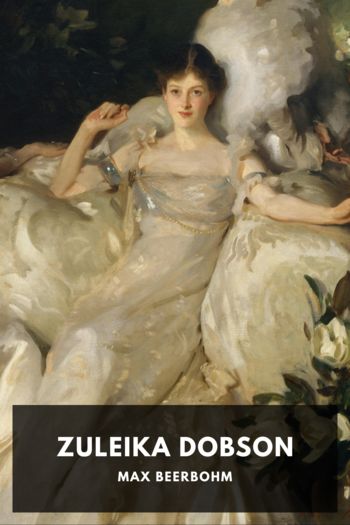Zuleika Dobson, Max Beerbohm [e ink ebook reader TXT] 📗

- Author: Max Beerbohm
Book online «Zuleika Dobson, Max Beerbohm [e ink ebook reader TXT] 📗». Author Max Beerbohm
A party of four undergraduates abreast was approaching. How should he address them? His choice wavered between the evangelic wistfulness of “Are you saved?” and the breeziness of the recruiting sergeant’s “Come, you’re fine upstanding young fellows. Isn’t it a pity,” etc. Meanwhile, the quartet had passed by.
Two other undergraduates approached. The Duke asked them simply as a personal favour to himself not to throw away their lives. They said they were very sorry, but in this particular matter they must please themselves. In vain he pled. They admitted that but for his example they would never have thought of dying. They wished they could show him their gratitude in any way but the one which would rob them of it.
The Duke drifted further down the High, bespeaking every undergraduate he met, leaving untried no argument, no inducement. For one man, whose name he happened to know, he invented an urgent personal message from Miss Dobson imploring him not to die on her account. On another man he offered to settle by hasty codicil a sum of money sufficient to yield an annual income of two thousand pounds—three thousand—any sum within reason. With another he offered to walk, arm in arm, to Carfax and back again. All to no avail.
He found himself in the precincts of Magdalen, preaching from the little open-air pulpit there an impassioned sermon on the sacredness of human life, and referring to Zuleika in terms which John Knox would have hesitated to utter. As he piled up the invective, he noticed an ominous restiveness in the congregation—murmurs, clenching of hands, dark looks. He saw the pulpit as yet another trap laid for him by the gods. He had walked straight into it: another moment, and he might be dragged down, overwhelmed by numbers, torn limb from limb. All that was in him of quelling power he put hastily into his eyes, and manoeuvred his tongue to gentler discourse, deprecating his right to judge “this lady,” and merely pointing the marvel, the awful though noble folly, of his resolve. He ended on a note of quiet pathos. “Tonight I shall be among the shades. There be not you, my brothers.”
Good though the sermon was in style and sentiment, the flaw in its reasoning was too patent for any converts to be made. As he walked out of the quadrangle, the Duke felt the hopelessness of his cause. Still he battled bravely for it up the High, waylaying, cajoling, commanding, offering vast bribes. He carried his crusade into the Loder, and thence into Vincent’s, and out into the street again, eager, untiring, unavailing: everywhere he found his precept checkmated by his example.
The sight of The MacQuern coming out top-speed from the Market, with a large but inexpensive bunch of flowers, reminded him of the luncheon that was to be. Never to throw over an engagement was for him, as we have seen, a point of honour. But this particular engagement—hateful, when he accepted it, by reason of his love—was now impossible for the reason which had made him take so ignominiously to his heels this morning. He curtly told the Scot not to expect him.
“Is she not coming?” gasped the Scot, with quick suspicion.
“Oh,” said the Duke, turning on his heel, “she doesn’t know that I shan’t be there. You may count on her.” This he took to be the very truth, and he was glad to have made of it a thrust at the man who had so uncouthly asserted himself last night. He could not help smiling, though, at this little resentment erect after the cataclysm that had swept away all else. Then he smiled to think how uneasy Zuleika would be at his absence. What agonies of suspense she must have had all this morning! He imagined her silent at the luncheon, with a vacant gaze at the door, eating nothing at all. And he became aware that he was rather hungry. He had done all he could to save young Oxford. Now for some sandwiches! He went into the Junta.
As he rang the dining-room bell, his eyes rested on the miniature of Nellie O’Mora. And the eyes of Nellie O’Mora seemed to meet his in reproach. Just as she may have gazed at Greddon when he cast her off, so now did she gaze at him who a few hours ago had refused to honour her memory.
Yes, and many other eyes than hers rebuked him. It was around the walls of this room that hung those presentments of the Junta as focused, year after year, in a certain corner of Tom Quad, by Messrs. Hills and Saunders. All around, the members of the little hierarchy, a hierarchy ever changing in all but youth and a certain sternness of aspect that comes at the moment of being immortalised, were gazing forth now with a sternness beyond their wont. Not one of them but had in his day handed on loyally the praise of Nellie O’Mora, in the form their Founder had ordained. And the Duke’s revolt last night had so incensed them that they would, if they could, have come down from their frames and walked straight out of the club, in chronological order—first, the men of the ’sixties, almost as near in time to Greddon as to the Duke, all so gloriously bewhiskered and cravated, but how faded now, alas, by exposure; and last of all in the procession and angrier perhaps than any of them, the Duke himself—the Duke of a year ago, President and sole Member.
But, as he gazed into the eyes of Nellie O’Mora now, Dorset needed not for penitence the reproaches of his past self or of





Comments (0)